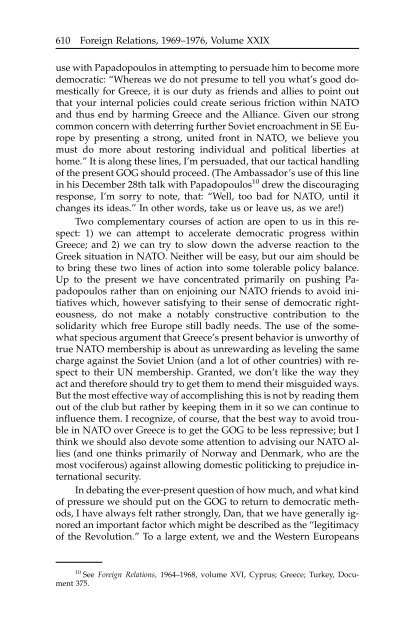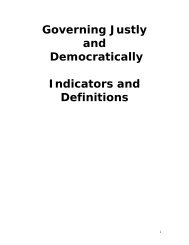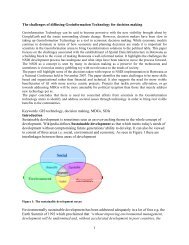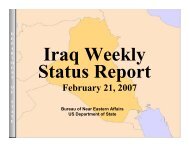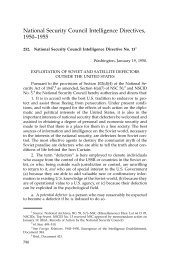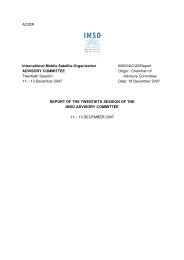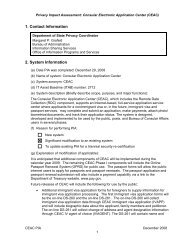Greece - US Department of State
Greece - US Department of State
Greece - US Department of State
Create successful ePaper yourself
Turn your PDF publications into a flip-book with our unique Google optimized e-Paper software.
610 Foreign Relations, 1969–1976, Volume XXIX<br />
use with Papadopoulos in attempting to persuade him to become more<br />
democratic: “Whereas we do not presume to tell you what’s good domestically<br />
for <strong>Greece</strong>, it is our duty as friends and allies to point out<br />
that your internal policies could create serious friction within NATO<br />
and thus end by harming <strong>Greece</strong> and the Alliance. Given our strong<br />
common concern with deterring further Soviet encroachment in SE Europe<br />
by presenting a strong, united front in NATO, we believe you<br />
must do more about restoring individual and political liberties at<br />
home.” It is along these lines, I’m persuaded, that our tactical handling<br />
<strong>of</strong> the present GOG should proceed. (The Ambassador’s use <strong>of</strong> this line<br />
in his December 28th talk with Papadopoulos 10 drew the discouraging<br />
response, I’m sorry to note, that: “Well, too bad for NATO, until it<br />
changes its ideas.” In other words, take us or leave us, as we are!)<br />
Two complementary courses <strong>of</strong> action are open to us in this respect:<br />
1) we can attempt to accelerate democratic progress within<br />
<strong>Greece</strong>; and 2) we can try to slow down the adverse reaction to the<br />
Greek situation in NATO. Neither will be easy, but our aim should be<br />
to bring these two lines <strong>of</strong> action into some tolerable policy balance.<br />
Up to the present we have concentrated primarily on pushing Papadopoulos<br />
rather than on enjoining our NATO friends to avoid initiatives<br />
which, however satisfying to their sense <strong>of</strong> democratic righteousness,<br />
do not make a notably constructive contribution to the<br />
solidarity which free Europe still badly needs. The use <strong>of</strong> the somewhat<br />
specious argument that <strong>Greece</strong>’s present behavior is unworthy <strong>of</strong><br />
true NATO membership is about as unrewarding as leveling the same<br />
charge against the Soviet Union (and a lot <strong>of</strong> other countries) with respect<br />
to their UN membership. Granted, we don’t like the way they<br />
act and therefore should try to get them to mend their misguided ways.<br />
But the most effective way <strong>of</strong> accomplishing this is not by reading them<br />
out <strong>of</strong> the club but rather by keeping them in it so we can continue to<br />
influence them. I recognize, <strong>of</strong> course, that the best way to avoid trouble<br />
in NATO over <strong>Greece</strong> is to get the GOG to be less repressive; but I<br />
think we should also devote some attention to advising our NATO allies<br />
(and one thinks primarily <strong>of</strong> Norway and Denmark, who are the<br />
most vociferous) against allowing domestic politicking to prejudice international<br />
security.<br />
In debating the ever-present question <strong>of</strong> how much, and what kind<br />
<strong>of</strong> pressure we should put on the GOG to return to democratic methods,<br />
I have always felt rather strongly, Dan, that we have generally ignored<br />
an important factor which might be described as the “legitimacy<br />
<strong>of</strong> the Revolution.” To a large extent, we and the Western Europeans<br />
10<br />
See Foreign Relations, 1964–1968, volume XVI, Cyprus; <strong>Greece</strong>; Turkey, Document<br />
375.


